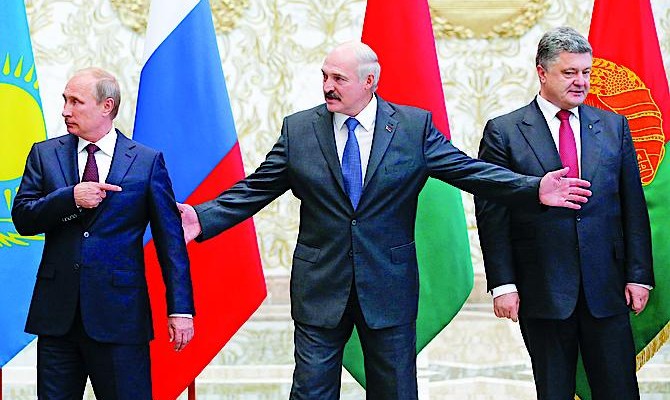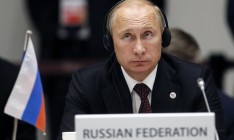Politics
hot spotThe presidents of Ukraine and Russia demonstrated their capacity for dialog

Yesterday, the trilateral negotiations between the EU, Ukraine and the Eurasian Trio (Russia, Belarus and Kazakhstan) were held in Minsk. For more than three hours the three sides tried to find ways to settle the situation in the Donbas region behind closed doors. Experts believe that yesterday’s meeting should serve as a basis for new, more successful talks.
Ukraine’s initiative
The Ukrainian side acted as the initiator of the meeting in this format, although the choice of the place was left for Russia to decide. Stopping violence in Donbas was the key issue discussed at the meeting. Energy and the Ukraine-EU Association Agreement were among other issues.
The Ukrainian delegation led by President Petro Poroshenko arrived in Minsk first. That is why prior to the trilateral meeting Poroshenko held a number of bilateral talks with the leaders of Belarus Alexander Lukashenko and Kazakhstan Nursultan Nazarbayev in Minsk concerning the need to find a solution to the Donbas problem.
The negotiations between the presidents and top representatives of the EU at the Independence Palace began with a delay because Vladimir Putin flew in an hour later than planned. Poroshenko still exchanged a handshake with the leader of Russia before an official photograph was taken.
The meeting was held in two formats: open and closed. In his address Putin dedicated 10 minutes to the issue of trade relations between Ukraine and countries of the Customs Union, once again repeating that Russia sees an economic threat in the implementation of the agreement between Kyiv and EU and is prepared to introduce protectionist measures.
Speaking about the conflict in Donbas, the Russian president noted that the conflict “cannot be settled through further escalation of the armed scenario without taking into account the essential interests of the southeastern regions of the country and without peaceful dialog with their representatives”.
President Poroshenko called on the participants of the meeting to accept his peace plan as the basis for ending the conflict. “I am convinced that such a move is relevant and the only possible instrument for stopping bloodshed and ensuring the post-conflict reconstruction of Donbas,” the Ukrainian president stressed, adding that all sides of the conflict can reach an agreement and end it “saving their own face”.
As a reminder, there are almost 20 clauses in Poroshenko’s peace plan, including seize fire, withdrawal of separatist troops to Russia, closing of the border from the Russian side and the release of hostages.
The Ukrainian president also stated that Kyiv was ready for dialog on disputable economic issues, but wants to conduct it “without the political pressure”.
Prolonged conversation
The closed part of the negotiations lasted for more than three hours and there was still no news about its results, when the newspaper was sent to print. The negotiations lasted longer than its organizers had planned. Indeed, the fact that a lunch break was announced at around 7:00 pm is testimony to this. It was planned that the one-on-one meeting between Putin and Poroshenko would be held during this break, but it was cancelled at the last moment.
Noteworthy, before that they met only once on June 6 in France. Then the meeting was informal and lasted for only several minutes and German Chancellor Angela Merkel was also present. On the eve of the Minsk meeting Merkel stated that one should not expect a breakthrough, even though the readiness of the parties to sit down at the negotiating table would be viewed as an achievement. “There is also a preliminary agreement on the meeting between Putin and Poroshenko in Turkey this week,” a source in the Ukrainian delegation told Capital.
Former press secretary of the Ministry of Foreign Affairs Oleh Voloshyn believes that yesterday’s meeting in Minsk even in the expanded format shows a certain rapprochement of the Russian and Ukrainian sides. “This means the two sides have shown willingness to talk and possibly reach an agreement,” said Voloshyn.
Former Director of the EU Department of the Ministry of Foreign Affairs of Ukraine Vasyl Fylypchuk harbors a similar opinion. “The key is that the meeting was held. Without direct talks with Russia the conflict will not end. Only direct contacts between Poroshenko and Putin will allow for finding a solution. Without an agreement with Putin we should expect an escalation of the aggression,” Fylypchuk told Capital. At the same time, Fylypchuk does not expect that the decisions made in Minsk will put an end to the war. On the contrary, he believes they will serve as the basis for a new round of negotiations.
Expert in international relations Serhiy Tereshko believes that today Kyiv and Moscow are not interested in preserving the current situation. “The Kremlin understands that the international situation is categorically unfavorable for Russia and a solution to this conflict must be found with minimum losses,” the expert told the publication. He believes that Poroshenko mentioned the possibility to ‘save face’ for a reason. “It was a hint to Putin,” Tereshko noted. He says the exclusion of the Crimean issue from the agenda of the negotiations can be labeled as Ukraine’s concession in Minsk.






 of the agreement of syndication with Financial Times Limited are strictly prohibited. Use of materials which refers to France-Presse, Reuters, Interfax-Ukraine, Ukrainian News, UNIAN agencies is strictly prohibited. Materials marked
of the agreement of syndication with Financial Times Limited are strictly prohibited. Use of materials which refers to France-Presse, Reuters, Interfax-Ukraine, Ukrainian News, UNIAN agencies is strictly prohibited. Materials marked  are published as advertisements.
are published as advertisements.